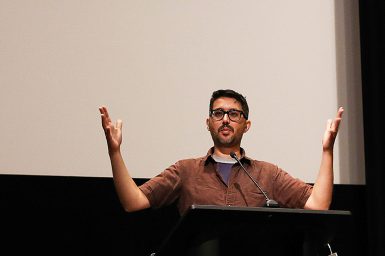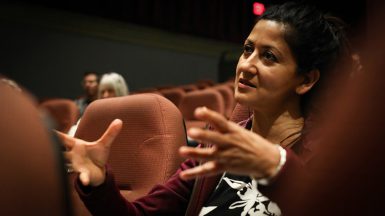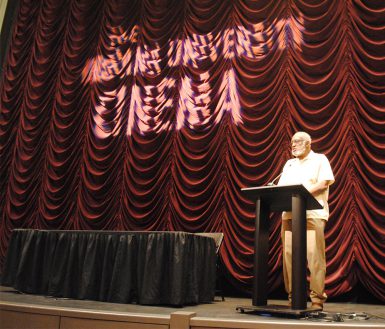Scholars discuss film’s place in historical transformation

The Media School’s Center for Documentary Research and Practice kicked off the first of its series of Sawyer Seminars with “Documentary Media and Historical Transformations” Sept. 15-16 at IU Cinema. The series explored the way non-fiction films play a role in historical changes.
“The seminar brings together film scholars, historians and filmmakers in order to think through how documentary both registers and sparks major social and historical changes,” said the center’s director and associate professor Joshua Malitsky, who with Marissa Moorman, associate professor of history, coordinated the seminar.
The seminar featured film screenings followed by lectures and discussion as well as presentations from visiting scholars.
Friday morning, Lee Grieveson, director of the graduate program in film studies at University College London, presented “Documentary and the Long 20th Century,” focusing on documentary’s emergence as a genre as the British liberal imperial state expanded.
As the genre emerged in Britain, it appeared in the U.S. as well.
“The cinema was quickly utilized to supplement and facilitate forms of economic and territorial imperialism,” he said. This quickly turned the films into important propaganda and educational tools.

One of Grieveson’s major points is that documentary should be seen as part of the infrastructure of colonialism, whether in terms of British territorial expansion or the U.S.’ economic imperialism. He addressed the ways governments and companies used nonfiction cinema in the U.S. to promote themselves and how this shaped how society saw certain topics and helped grow documentary as a film genre.
For example, he showed a still from a promotional film the U.S.D.A. used in the early 1900s. The still showed a screening room with a very bright screen, even brighter than the moon outside. Grieveson said this is a metaphor for how the USDA believed it could enlighten the world with new technologies.
“Quite simply, these films documented imperial conflict and expansion,” said Grieveson.
But should these films be considered documentaries or propaganda?
“The definitional question seems to me rather superfluous, trifling even, given their worth to an understanding of a significant turning point in global history and indeed the cinema as a form of media,” he said.
The lecture concluded with questions from the audience regarding the problems and perks of using documentary films as propaganda.

“I think this was one of the most elucidating, stimulating talks that I’ve heard in many, many years, and I am very grateful for it,” said Prexy Nesbitt, an adjunct professor at Columbia College, after the audience and Grieveson debated whether film could be viewed as infrastructure.
And that is the goal of the Sawyer Seminar.
“It’s really about bringing together filmmakers and scholars,” said Malitsky.
The next series ,“Capturing the Imagination: Independence and the Claim to Rights,” is set for Oct. 20-21.
The series is funded by a grant from the Mellon Foundation. In addition to the center, the Black Film Center/Archive and The Media School, sponsors include IU Cinema, the Institute for Advanced Study and the Office of the Vice President for Diversity Equity and Multicultural Affairs.

